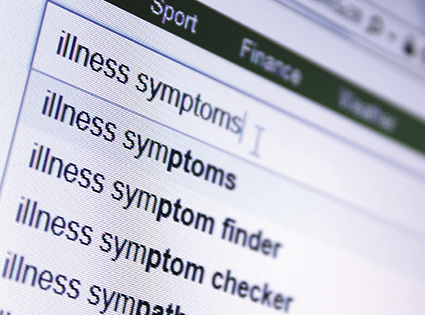Google Searches for Health Information in Spanish Questionable
Spanish speakers searching for health information online are warned that Google’s advice isn’t always helpful. Sometimes, it’s downright terrifying.
Researchers at Rutgers University found that during the height of the COVID-19 pandemic, Google search autocompletes (what the technology company calls “predictions”) returned different results in Spanish than in English. In many cases, the suggested Spanish search terms were more fear-inducing and stress-inducing than the English equivalent. For instance, the researchers found that typing “coronavirus is” into Google yielded search predictions including “contagious”, “man-made,” and “airborne.” In contrast, in Spanish, “coronavirus es” prompted “mortal,” “falso” (fake), and “peligroso” (dangerous). “The health consequences of this data are profound,” said Pamela Valera, an assistant professor in the Department of Urban-Global Public Health at the Rutgers School of Public Health and lead author of the study published in the Journal of Community Psychology, New Brunswick, New Jersey. “This is one of the first studies to explore the differences in autocompletes and search quality across these two languages,” said study co-author Vivek K. Singh, an associate professor at the Rutgers School of Communication and Information. Every day, billions of internet searches are powered by Google, and autocomplete predictions help deliver results faster by suggesting queries. Language, location, trending interest, and past searches influence what is displayed. However, predictive algorithms carry inherent bias, which can impact public health outcomes and behaviors. One good example was when the researchers found English autocompletes for the term “hand sanitizer” returned mostly positive predictions. Still, in Spanish, the predictions were negative, potentially influencing the use of disinfectants among Spanish speakers. To explore language differences in Google search autocompletes during the first wave of the pandemic, the researchers conducted three focus groups with 29 participants. The first meeting was in English with non-Spanish speakers, the second with Spanish speakers only, and the third with bilingual and bicultural participants. These virtual meetings lasted between 90 and 120 minutes. Several themes emerged from the conversations. First, autocompletes evoked fear and stress among Spanish speakers and skepticism and hesitation toward autocomplete searches themselves. The researchers also found that autocompletes promote search preselection, potentially leading people toward biased information. Finally, the study found that English autocompletes for COVID-19-related terms far outnumbered those in Spanish, three-to-one in some cases. This study was part of a larger research project funded by the National Science Foundation that focused on understanding algorithm bias on Google. Google is a major important tool for searching for health-related information. However, Singh said technology companies should do more to ensure that search suggestions are consistent across languages. “Arguably, more web content exists in English, but there are opportunities for Google to use the wealth of knowledge that exists in all languages to create products and autocomplete suggestions that are more comprehensive and more equitable across languages,” said Singh. “This would be good for the quality of their results and for anyone who Googles health-related information.” |
